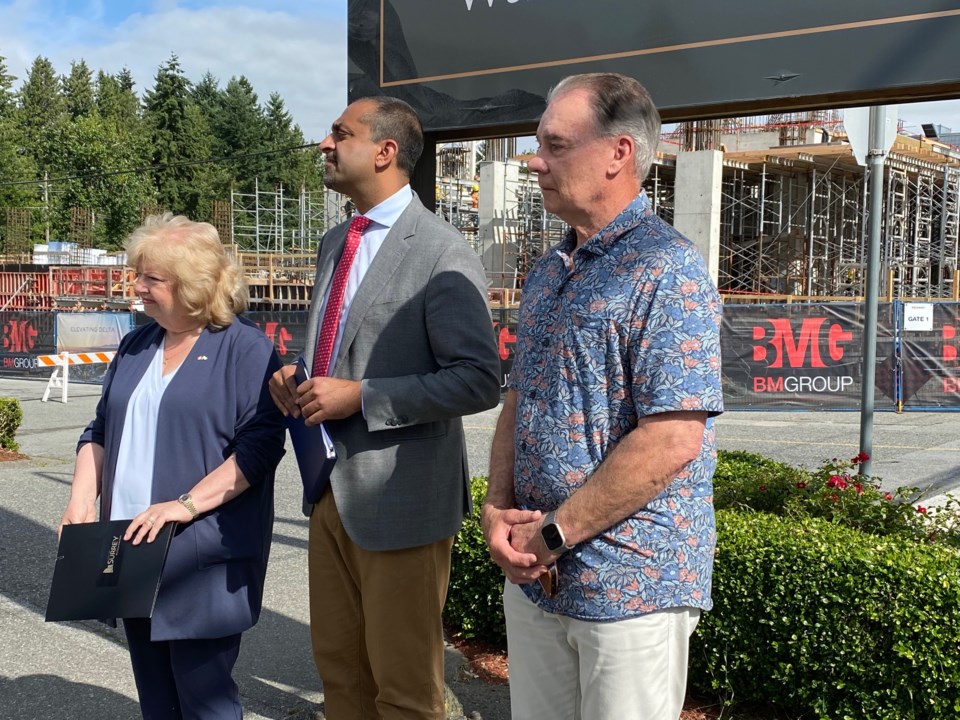It’s another step in helping the development community overcome financial challenges when it comes to getting new housing built sooner.
That was the gist of a recent announcement by the province regarding development cost charges (DCCs), making regulatory changes that protect homebuilders' projects from increases in Metro Vancouver Regional District DCCs.
Eligible projects will now be protected from increases to development cost charges for 24 months instead of the previous 12.
The move is help to ensure that homebuilders, future home buyers, renters and tradespeople in Metro Vancouver will have more certainty that housing projects, which are planned or under construction, will continue to be built, according to the Ministry of Housing and Municipal Affairs.
In a news release, the province noted that homebuilders who submitted an application before March 22, 2024, and were issued permits between March 23, 2025, and March 22, 2026, will benefit from having lower development cost charge rates than new projects.
It’s the latest in a series of moves when it comes to DCCs.
Ravi Kahlon, who until last week was BC’s Minister of Housing, was in North Delta earlier this month for another announcement, joined by Delta Mayor George Harvie, Surrey Mayor Brenda Locke and others, including representatives with the Urban Development Institute (UDI) and Homebuilders Association Vancouver.
Municipalities will now be able to defer collection of DCCs to developers for larger new housing projects until the time of occupancy, with just 25 per cent to be paid up front.
Development fees and DCCs that help fund infrastructure had to previously be paid up front, something both Surrey and Delta had been advocating be changed to reduce borrowing costs for developers constructing new housing, while not impacting the bottom line for municipalities.
Earlier this year, Delta council agreed to have staff conduct a financial analysis on delaying collection of DCCs to time of issuance of occupancy permits instead of at time of a subdivision application or issuance of a building permit, depending on the land use category.
The motion was put forward by Harvie, noting residential and commercial development activity has significantly stalled because of increases in prices for building materials, skilled labour, higher financing costs and scheduled increases to the City of Delta, Metro Vancouver and TransLink DCCs.
Harvie said the change would not be any kind of subsidy but simply a change in process which would result in reducing “considerable impacts” having to borrow for DCCs before projects can get going.
Council last year approved increased Delta’s DCCs after a lengthy review to reflect new growth projections, development-driven infrastructure projects and current-day construction costs. The previous update was approved in 2017.
Metro revising its DCCs
Meanwhile, Metro Vancouver is currently undertaking a comprehensive review of its DCC structure, gathering feedback from municipalities and stakeholders.
According to the regional district, it is revising its DCC program to ensure the program is responsive to social, political, and economic circumstances. The current revision began in 2025 and will continue through 2027, with new rates taking effect in 2028.
Drivers for the revision include, among other factors, adjustments to Metro’s capital plan based on updated population and dwelling unit estimates, new definitions of different housing types and commitments to the provincial and federal governments.
Potential changes could include updates for the Affordable Housing DCC Waiver program and exploring whether the waiver program should be expanded to include affordable housing units delivered by the private sector.
Among the other changes is an update to categories of housing types, including considering unit types such as multiplex development and purpose-built rentals.
The region is also looking at expanding the “non-residential use” categories to better account for different infrastructure demands of different land uses, including consideration of a separate rate and category for agricultural development.



